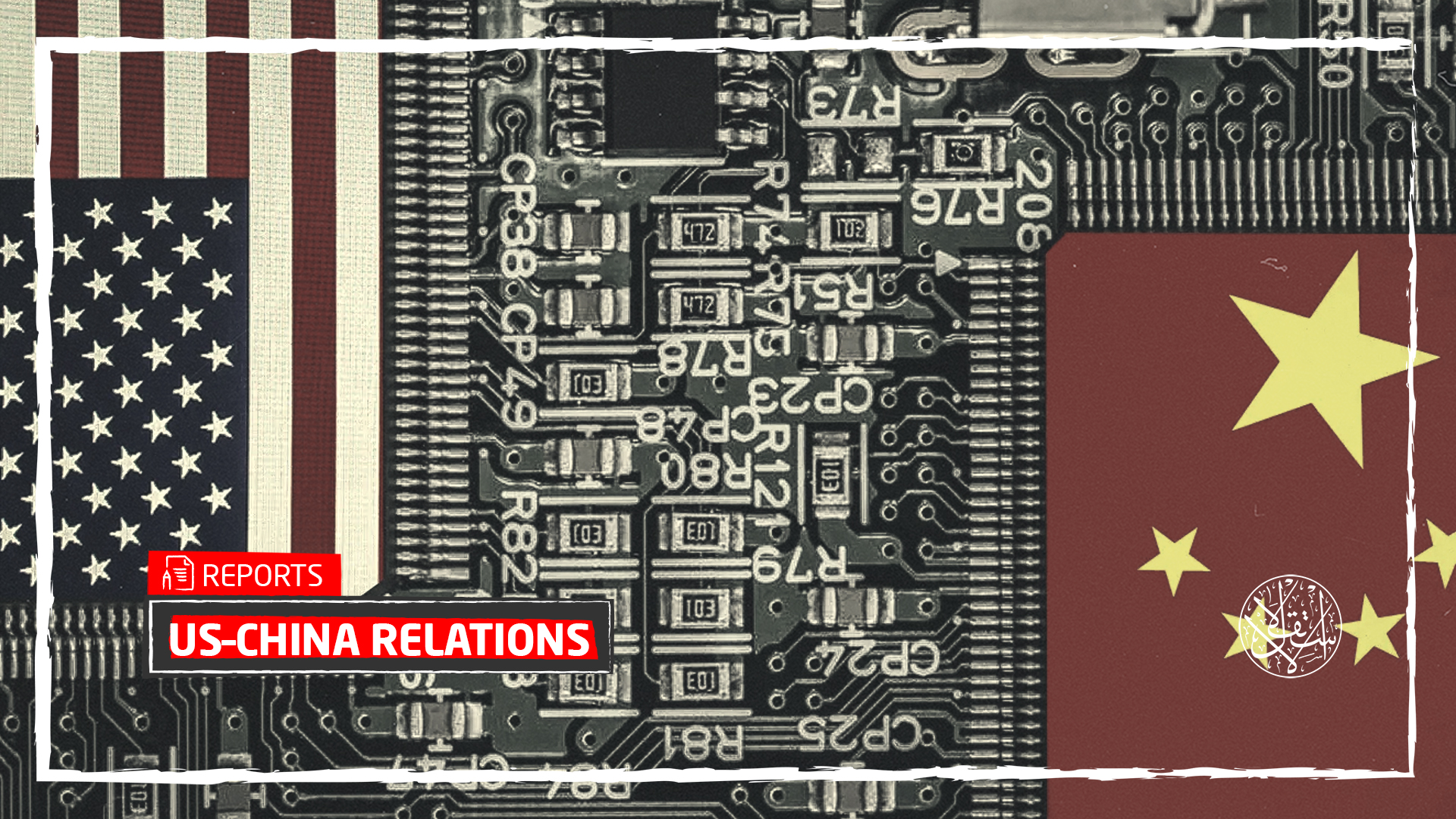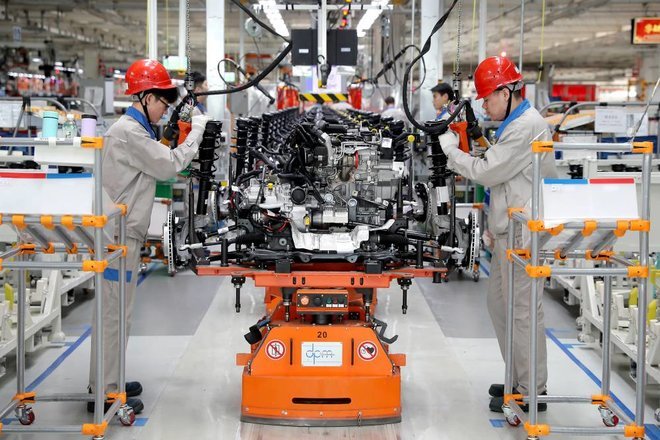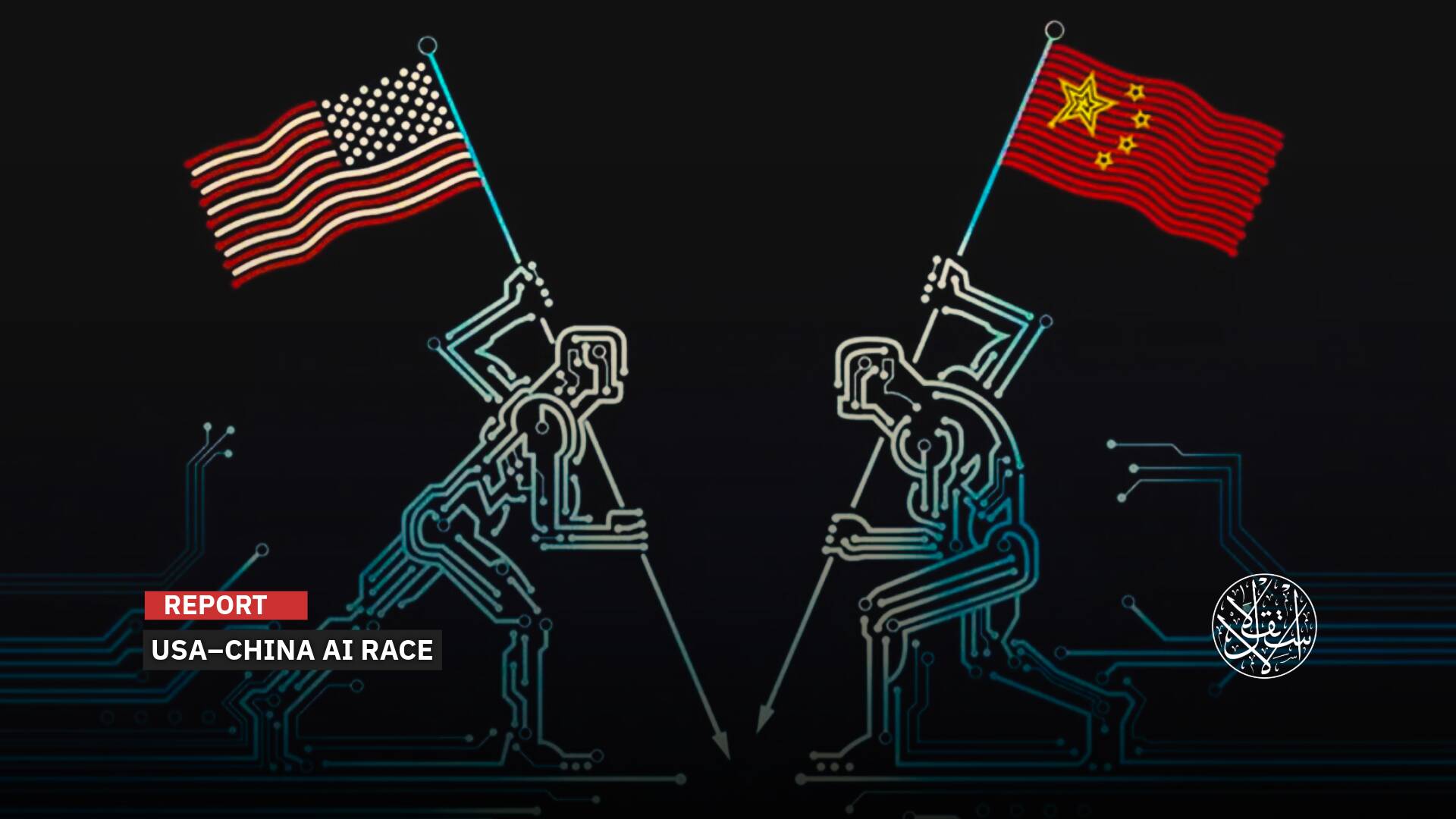The "Electronic" War between China and America

For several months, the world has witnessed a major electronic crisis represented by the difficulty of obtaining electronic chips, which are the key to operating and controlling any device.
This crisis led to a decline in the production of industrial giants and major international companies, in addition to raising the level of tension between China and the United States of America.
These segments, of a delicate and sensitive size, have become a prominent title in the conflict between America and China that has intensified in the past few years.
The war on Chinese technology companies has been a feature of the US-Chinese confrontation since the administration of former President Donald Trump began designating a number of them as a threat to US national security.
Controlling chip or semiconductor manufacturing in this century is like controlling oil supplies in the last century, when a state that controls the industry can be a threat to the military and economic power of other countries.
Therefore, it was obvious for "Taiwan" to become the focus of attention of China and America because of its control over 70 percent of the global production of these chips, which are the focus of the technological ambitions on which the two world powers depend.
The administration of US President Joe Biden has begun moving to place semiconductors, artificial intelligence and next-generation networks at the heart of US strategy toward Asia, to face China.
Beijing, in turn, has increased its military activity and its harassment of the Taiwanese island, which is no more than 140 km away and separated by the Formosa Strait.
Will the control of electronic chips push the world's production and marketing towards a third world war ? What about the status of "Taiwan" and its role in this war?
Slide Crisis
In a report published by "Bloomberg" agency, on April 20, 2021, experts monitor the main causes of the chip crisis that the world witnessed, with reference to the "Coronavirus" epidemic.
In addition, the Chinese technology company "Huawei" purchased huge quantities of chips in secret ways, and stored them to face the trade war with America.
This has left a huge impact on everything that has a chip, such as cars, smartphones, game consoles, tablets, and laptops.
“Bloomberg” indicated that the quantities of some models of the “iPhone 12” phone were limited due to the lack of components, and attributed the difficulties in obtaining the “PlayStation 5” device from “Sony” and the latest “Xbox” device from “Microsoft” to the shortage in some chips.
The impact of chip shortages on the global auto industry was evident, as companies announced successively adjustments to their production chains.
On March 19, 2021, the French news agency AFP reported that the Japanese "Nissan" will suspend part of its production in North America for days due to the ongoing shortage of semiconductors, according to a spokesman for the group.
The group allied to the French company Renault will also stop production in Mexico for several days.
This came after "Honda" and "Toyota" also announced that production stopped for a week in many of their factories in North America due to multiple problems in the supply of spare parts.
Because of the global shortage of semiconductors, both Honda and Nissan, in February, cut their sales forecasts for the 2020/2021 fiscal year.
Reuters said that Japan's second and third largest car manufacturers, "Honda Motor" and "Nissan Motor", will sell 250,000 fewer cars in the current fiscal year for the two companies, as the global shortage of semiconductor chips affects the production.
The American "General Motors" also said that the global semiconductor chip shortage could reduce 2021 profits by up to two billion dollars, and extended production cuts at three North American plants.
On February 4, "Ford Motor" announced that it will temporarily reduce work shifts at two factories to assemble its main truck, "F-150", starting next week, amid a semiconductor shortage that is suffering from a growing number of automakers.
"Working closely with suppliers to address potential production constraints is caused by the global shortage of semiconductors, and is prioritizing major automotive production lines."
On the same day, Mazda Motor said it expects that the production will shrink by 7,000 vehicles this month due to a lack of chips as a car contains between 50 and 150 of these chips.

Manufacturing Companies
A few major companies such as Taiwan's TSMC, Korea's SAMSUNG, and US INTEL dominate the production of these chips.
Although there are some small chip manufacturers out there, they are not able to make the most accurate, newer, and better performing processors.
Taiwan Semiconductor Manufacturing Co., Ltd. is the largest of its kind in the world, and its chips are found in just about everything: smartphones, high-performance computing platforms, computers and cars.
So do almost all weapon systems built in the 21st century, with Taiwan making about 60 percent of the chips used by American companies in 2020.
TSMC has announced that it will build a $12 billion plant in Arizona to make some of its most advanced chips.
In a report published by the American newspaper "The New York Times", writer Rocher Sharma said that Taiwan "is the first in making thinner, faster and stronger chips or semiconductors."
"Its chips form the foundations of rapidly developing digital industries such as artificial intelligence and high-speed computing, while the thinner chips will power the 'internet of things'," he added.
Any country looking to dominate the digital future should buy these ultra-fast and ultra-thin chips from Taiwan or South Korea.
Taiwan has the advantage in terms of technology and market power, and although it is a small island of just 24 million people, it is at the center of the battle for global technological supremacy.
As the Cold War between China and the United States escalates, this importance will continue to grow.
On the other hand, there is no room for doubt that the electronics industry in China has come a long way with the passage of time.
The country went from being famous for its poor quality counterfeit electronics at the turn of the millennium, to becoming the home of some of today's biggest smartphone companies, and until now Chinese companies dominate various tech manufacturers' rankings.
Of course, part of this development has been related to electronic chips, as China exports about $100 billion of them.
China exports a large number of electronic chips, but it is far from self-sufficient.
As the chips manufactured in China are usually of the simplest and lowest levels of performance, and so far Beijing imports three times more electronic chips than it exports, which means that it does not cover its internal needs.
This was confirmed by Anjani Trivedi in an article in the Middle East on March 9, 2021, saying, "The stark fact is that when it comes to chip-making machines, China cannot produce what the world needs. Self-sufficiency in semiconductors is still low."
This is what the communications expert, Eng. Rabie Al-Saket, said in an interview with Al-Estiklal, saying: "China cannot reach sufficiency with digital chips. Washington is far ahead of it, and it controls the world through that."
Saket points out that China's endeavor to improve its chip production depends on its ability to detect the precise technologies through which the chips are manufactured in Taiwan and North Korea.
World War?
All of these developments have brought back the spotlight on the Sino-Taiwan crisis, whose roots go back to the days of the Chinese Civil War, and the consequent domination of the Communists in China, the gathering of nationalists on the island of Taiwan and the proclamation of an autonomous republic.
The researcher in international relations, Dr. Tariq Al-Mubaid, told Al-Estiklal: "China has never abandoned its claim to Taiwan, which it views as a rebellious province, and that makes the possibilities of war looming over the region permanently."
He adds, "Taiwan is a historically strategic island for China, and most of the military strikes it has received were through this island."
Al-Mobaied believes that Beijing will push its power towards controlling Taiwan for two reasons: "The first is not to allow Washington to besiege Beijing through Taiwan after its withdrawal from Afghanistan, and the second is to seek to obtain the largest amount of electronic chips to develop the Chinese economy."
In March 2021, the Taiwanese government said that the trade war between China and America had prompted Beijing to intensify its efforts to steal technology and talent from Taiwan to promote self-sufficiency in the chip industry.
The Taiwanese Minister of Economy also announced that the trade war between the two giants has created new risks, as she indicated that China is hunting for talent and infiltrating Taiwanese factories.
She added that the Taiwanese chip workers are deeply experienced and speak the same language, which means they are a natural target for China.
The Russian Sputnik agency said in April 2021 that China had pushed more of its fighters into the Taiwanese air defense zone, in a new escalation of the show of force around the island, while Taiwan's Foreign Minister said that his country would fight to the end if Beijing attacked it.
Taiwan has complained about Beijing's increased military activities in the past few months, as the Chinese air force are daily penetrating Taiwanese airspace.
On the other hand, Professor of Sociology at the Lebanese University, Dr. Ghassan Khaled, in an interview with Al-Estiklal, ruled out the occurrence of a war between China and the United States of America.
He says, "The concept of war has changed with the change of priorities, tools and means, and the war of influence that we are living in today between Beijing and Washington, will not push the former to start a military war under the title of recovering Taiwan."
Khaled points out that the positions of the influential major countries are not with the war, adding: "We may witness a trade war, cyber and diplomatic crises, but the exhausted global economy is pushing us to exclude the hypothesis of a military war between the two parties."
Khaled added, "Today, the conditions are not conducive to a new world war, but with the development of events, no one can guarantee that China will not invade Taiwan and face a new global catastrophe."
Retired US Navy Admiral James Stavridis believes that the top priority of the Chinese army is to ensure its ability to control and extend control at sea, while demonstrating clear naval power around Taiwan.
James adds in an article published by the Saudi newspaper Al-Sharq al-Awsat on May 3, 2021 that Chinese President Xi Jinping and the Chinese leadership pledged to return the "dissident" province to the motherland.
Although they try to achieve this with a policy of deliberation and patience, they will be ready to resort to military force if necessary at some point.
The former admiral supports his opinion with the testimony of Admiral Phil Davidson, head of the Indo-Pacific Command in the US Department of Defense, which he recently presented to Congress, that he appreciates the Chinese leadership's resort to military action to restore Taiwan within six years from now.










